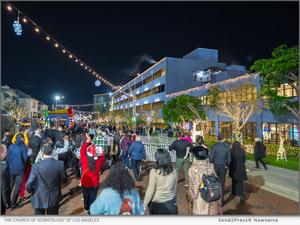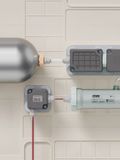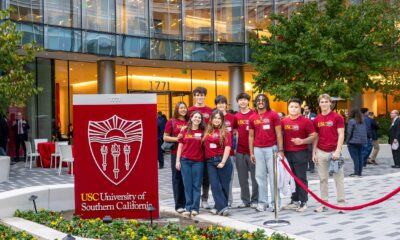Science
Hydrogen-Powered Caravan Completes 365-Mile Journey Across Texas

A recent hydrogen fuel cell-powered caravan successfully completed a 365-mile round trip from Austin to Houston, showcasing the advancements in hydrogen technology in Texas. A group of students and staff from the University of Texas at Austin’s Center for Electromechanics (CEM) participated in this journey to attend the Hydrogen Technology Expo. This event marks a significant milestone in the state’s emergence as a key player in the global hydrogen sector.
In 2003, a similar demonstration occurred in California, where a convoy of hydrogen-fueled vehicles navigated the Los Angeles area with a police escort due to safety concerns surrounding the then-nascent technology. Nearly two decades later, the atmosphere surrounding hydrogen vehicles has changed dramatically. Alan Lloyd, a prominent figure in hydrogen research, joined the Texas caravan, reflecting on the progress made since those early days. “We drove effortlessly and smoothly along Highway 290,” Lloyd stated. “Seeing what we had started 20 years ago in California manifest on Texas roads is satisfying.”
The Toyota Mirai vehicles used for this journey demonstrated remarkable efficiency, averaging the equivalent of 85 miles per gallon. The fleet returned to Austin with a quarter tank of fuel remaining, illustrating the viability of hydrogen vehicles for long-distance travel. This successful trip underscores the ongoing developments in hydrogen research and celebrates 20 years of innovation at CEM.
Advancements at the Hydrogen ProtoHub
The journey coincided with the opening of the Hydrogen ProtoHub, a state-of-the-art facility at the J.J. Pickle Research Campus launched in April 2024. This pioneering site features on-site hydrogen generation, storage, and distribution capabilities, enabling comprehensive testing and development of hydrogen technologies. Mike Lewis, director of CEM, emphasized the dual purpose of the facility: “We are looking to help meet the power demands of AI and data centers, so we are using some of the hydrogen we generate on-site to create power for the Texas Advanced Computing Center.”
The Hydrogen ProtoHub also serves as the only publicly available hydrogen fueling station in Texas. With the state currently lacking a comprehensive hydrogen fueling network, the team faced uncertainties during their trip. “The range anxiety is real, partially caused by the Toyota Mirai displaying a conservative value for miles to empty,” said Austin Mabrey, a research engineer at CEM. Despite concerns, the team successfully completed the journey, demonstrating the growing potential of hydrogen technology.
In addition to the logistical challenges, the initiative aims to address broader energy concerns. The North Central Texas Council of Governments recently received a federal grant to establish a network of heavy-duty truck fueling stations, enhancing the infrastructure necessary for hydrogen fuel cell vehicles. Collaborative projects like the HyVelocity Hydrogen Hub are also in development to support hydrogen production and distribution systems across the Texas Gulf Coast.
Student Engagement and Future Implications
For students like Grace Childers, a senior chemical engineering student who drove one of the vehicles, this experience has been career-defining. Over the past three years, Childers has gained practical experience at the Hydrogen ProtoHub, focusing on hydrogen production and its applications in fuel cell electric vehicles. She explained the fueling process to those unfamiliar with hydrogen technology, noting that “the hydrogen gas in the car combines with oxygen, and that reaction creates energy. The only emission is water vapor.”
The trip also allowed students and staff to apply theoretical knowledge in a real-world context, reinforcing the importance of hands-on experience. During previous range tests, the team managed to drive more than 25,000 miles on Texas roads, averaging 76 miles per gallon equivalent overall. This practical exposure equips students for future careers in the energy industry, as they witness firsthand the potential of hydrogen as a clean energy source.
As Texas moves towards becoming a significant hub for hydrogen technology, initiatives like the Hydrogen ProtoHub are essential for workforce development and education. “Taking what they’re learning in school — all the math, physics and thermodynamics — and really making it real and tangible is invaluable,” Lewis added. The enthusiasm surrounding the recent road trip indicates a promising future for hydrogen vehicles and their potential to contribute to sustainable energy solutions.
-

 Technology5 months ago
Technology5 months agoDiscover the Top 10 Calorie Counting Apps of 2025
-

 Technology2 weeks ago
Technology2 weeks agoOpenAI to Implement Age Verification for ChatGPT by December 2025
-

 Health3 months ago
Health3 months agoBella Hadid Shares Health Update After Treatment for Lyme Disease
-

 Health3 months ago
Health3 months agoAnalysts Project Stronger Growth for Apple’s iPhone 17 Lineup
-

 Health3 months ago
Health3 months agoErin Bates Shares Recovery Update Following Sepsis Complications
-

 Technology5 months ago
Technology5 months agoDiscover How to Reverse Image Search Using ChatGPT Effortlessly
-

 Technology3 months ago
Technology3 months agoElectric Moto Influencer Surronster Arrested in Tijuana
-

 Technology2 months ago
Technology2 months agoDiscover 2025’s Top GPUs for Exceptional 4K Gaming Performance
-

 Technology5 months ago
Technology5 months agoMeta Initiates $60B AI Data Center Expansion, Starting in Ohio
-

 Technology5 months ago
Technology5 months agoRecovering a Suspended TikTok Account: A Step-by-Step Guide
-

 Health5 months ago
Health5 months agoTested: Rab Firewall Mountain Jacket Survives Harsh Conditions
-

 Lifestyle5 months ago
Lifestyle5 months agoBelton Family Reunites After Daughter Survives Hill Country Floods




















